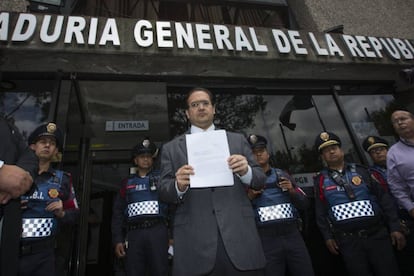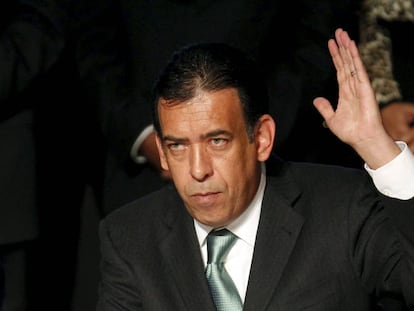Why Mexico has been named the most corrupt developed country
World Economic Forum report also places Venezuela at top of list of Latin American nations for graft

Mexico has once again found itself at the top of a list of nations grappling with one of the developed world’s most complex and common problems: corruption.
According to the World Economic Forum (WEF), the North American country is the 13th most corrupt nation in the world thanks to high levels of organized crime. And when developing countries are excluded, Mexico rises to the top of the list.
Corruption is one of the elements that the Swiss organization includes in its annual competitiveness index. The report is based on interviews with 15,000 business leaders in 141 economies. The WEF asks each leader three questions: “In your country, how common is illegal diversion of public funds to companies, individuals, or groups? In your country, how do you rate the ethical standards of politicians? In your country, how common is it for firms to make undocumented extra payments or bribes?”
On a scale of 1 to 7, where 7 represents highest transparency, Mexico scored 2.5, according to Business Insider.
Investors are jittery about Mexico because of corruption, organized crime and inefficient bureaucracy
The WEF report is not happy reading for Latin America either, with five of the top-10 most-corrupt nations in the world in the region. Venezuela heads the group with a score of 1.7, followed by Bolivia (2), Brazil and Paraguay (2.1) and the Dominican Republic (2.2). But these countries are not members of the Organisation for Economic Cooperation and Development (OECD), as membership in the group requires a developed, industrialized economy.
In June, the organization also published a report based on a survey of political and business leaders that said corruption was the most important problem facing Latin American nations. Scandals such as the bid-rigging and bribery scandal at Brazil’s Petrobras, allegations against former Argentinean President Cristina Fernández de Kirchner, and bribery accusations against former Guatemalan President Otto Pérez-Molina, all kept most countries in the region where they were on that list back in 2014 and 2015.
In Mexico’s case, however, its high corruption score is especially alarming because the North American country, unlike its neighbors, is a developed economy. Mexico ranks number 51 in competitiveness among the world’s 138 nations after it climbed up six spots, thanks to strong gains in market efficiency. Yet the country presents a number of factors that scare off investors: corruption, the most serious among them, followed by organized crime and inefficient bureaucracy and tax laws.
The least transparent nations in the developed world
According to the World Economic Forum, the most corrupt developed countries in the world are:
1. Mexico (2.5)
2. Slovakia (2.7)
3. Italy (3.1)
4. Hungary (3.1)
5. Greece (3.2)
6. Czech Republic (3.3)
7. Spain (3.4)
8. South Korea (3.5)
9. Poland (3.7)
10. Slovenia (3.7)
(Source: Business Insider)
“Primary education continues to be a significant competitiveness weakness compared to regional and global leaders, and institutional quality is lagging. The Mexican economy has been hit by falling oil prices, weak global trade, and a resulting fall in industrial production,” the WEF says in its report.
Urban environmental crisis
Corruption not only makes it difficult to do business in Mexico, but it also affects the environment, the report says. In March, Mexico City suffered its worst environmental crisis in 14 years: air pollution reached levels that presented a threat to the health of its residents and the city’s government quickly implemented a controversial program to reduce contamination.
Yet, according to a WEF report published in May, the city also engages in a number of practices that actually thwart any attempt at improving air quality: bribery at motor vehicle department offices, public transport in the hands of private business leading to lax regulations, and embezzlement in the administration of Mexico City Metro’s new line, which opened in 2012 and, shortly after, closed for repairs.
English version by Dyane Jean-François
Tu suscripción se está usando en otro dispositivo
¿Quieres añadir otro usuario a tu suscripción?
Si continúas leyendo en este dispositivo, no se podrá leer en el otro.
FlechaTu suscripción se está usando en otro dispositivo y solo puedes acceder a EL PAÍS desde un dispositivo a la vez.
Si quieres compartir tu cuenta, cambia tu suscripción a la modalidad Premium, así podrás añadir otro usuario. Cada uno accederá con su propia cuenta de email, lo que os permitirá personalizar vuestra experiencia en EL PAÍS.
En el caso de no saber quién está usando tu cuenta, te recomendamos cambiar tu contraseña aquí.
Si decides continuar compartiendo tu cuenta, este mensaje se mostrará en tu dispositivo y en el de la otra persona que está usando tu cuenta de forma indefinida, afectando a tu experiencia de lectura. Puedes consultar aquí los términos y condiciones de la suscripción digital.










































